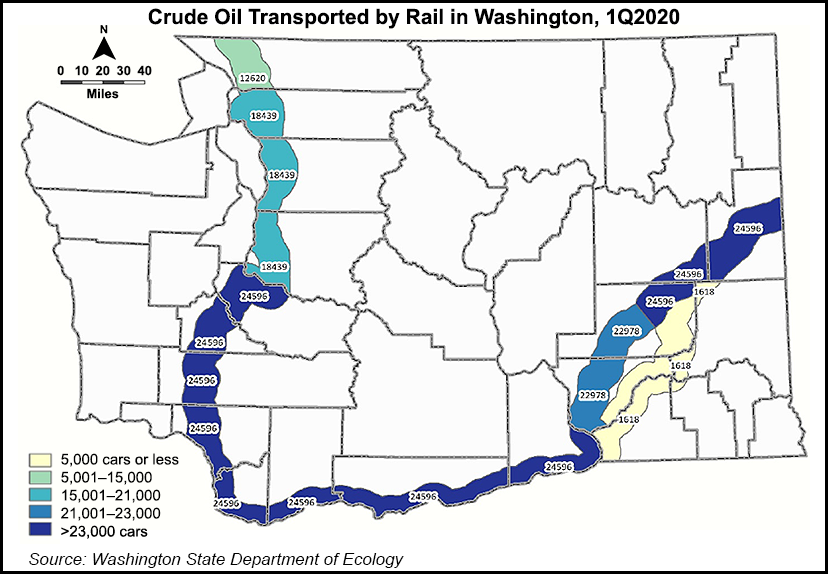Shale Daily | Bakken Shale | E&P | NGI All News Access | Regulatory
PHMSA Ruling Puts Onus on Washington State in Standoff Over Bakken Oil Shipments by Rail
The U.S. Pipeline and Hazardous Materials Safety Administration (PHMSA) on Monday withdrew a proposal to limit vapor pressures when crude oil is transported by rail, which could be a positive for Bakken Shale oil to be moved west by rail in an ongoing dispute with Washington state.

In withdrawing the proposed rulemaking, PHMSA relied on a recent study by the Sandia National Laboratories, which found that vapor pressure for oil “is not a significant factor in the severity of pool fire or fireball scenarios.” PHMSA said establishing vapor pressure limits “would not improve the safety of crude oil rail transportation.”
Federal law governs the transport of hazardous materials, PHMSA noted, and it would preempt state-imposed vapor pressure limits for crude loaded or unloaded from rail cars within a state’s borders.
Allowing states to set individual vapor pressure limits would create a “patchwork state regulation,” PHMSA said, which Congress sought to avoid when it enacted the Hazardous Materials Transportation Act in 1975. Federal standards require crude oil to be conditioned to 14.7 pounds/square inch (psi) for transportation. North Dakota requires its operators to condition Bakken crude to 13.7 psi before transporting it from the state. However, Washington requires crude to be at 9 psi Reid Vapor Pressure, which effectively would block Bakken crude from being unloaded into the state.
PHMSA kept in place Washington’s advance notification requirements, enabling it to track when oil is being transported by rail to inform first responders and help prepare for any possible spill-related emergency.
In recent weeks, Washington regulators have moved ahead to restrict oil rail offloading, causing a standoff, with North Dakota claiming U.S. Constitution violations and Washington contending that vapor pressure testing be done when supplies are unloaded.
North Dakota Gov. Doug Burgum said PHMSA’s determination was based “on sound science and preserving our state’s constitutionally protected right to interstate commerce. Washington state’s law was based on an unsupported, erroneous assumption that Bakken crude oil poses a higher transport risk than other crude oils, when in fact it is shipped in a manner that’s even safer than what federal standards require.”
Washington Department of Ecology spokesperson Ty Keltner said state regulators were reviewing the 74-page decision. Regulators were disappointed that the vapor pressure law was not affirmed by PHMSA, but he said the federal law did not prohibit the state statute.
“It has not been repealed, and no court has invalidated it or issued an injunction preventing its enforcement,” Keltner said. “The state law helps protect the public from the inherent risks of transporting oil by rail by decreasing explosion risk in the event of an oil train derailment. Public health remains are top priority, and we are considering our legal options.”
© 2024 Natural Gas Intelligence. All rights reserved.
ISSN © 2577-9877 | ISSN © 2158-8023 |
